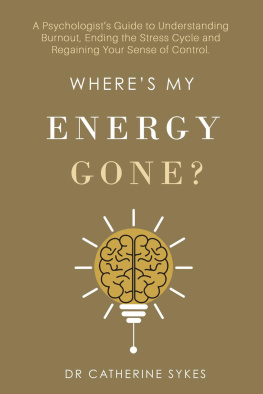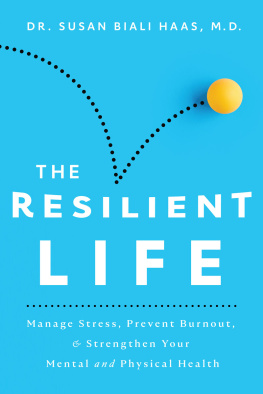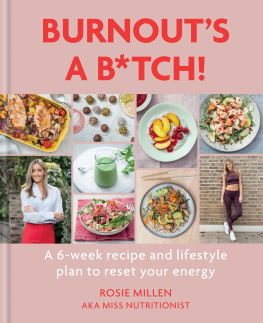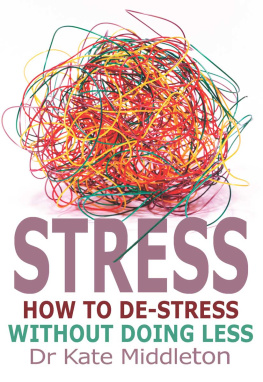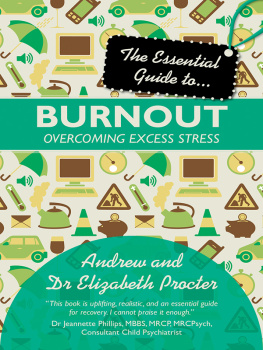All rights reserved.
No portion of this book may be reproduced in any form without permission from the publisher, except in the case of brief quotations embodied in critical reviews and certain other non-commercial uses permitted by copyright law. For permissions contact: Catherine@drcatherinesykes.com.
Introduction
Does everything feel a bit too much?
Too much to do, too much communication, too much uncertainty.
I n your efforts to keep up, are you multitasking, struggling to put in the required effort, assuming any failings are down to you and you alone? Do you feel that when you try to share, your problems seem minimal compared to everyone elses, leaving you feeling unheard and lonely?
Is it all getting on top of you?
Do you want a sense of control over your life? Do you want to feel as though you have the capacity to achieve your life goals?
I understand you. The world is changing at an increasingly fast pace. The problem is humans are not changing. As a practising psychologist, I have seen an unprecedented increase in clients whose mental health breakdowns and unexplained illness stories start with being too busy, overwhelmed and constantly exhausted. They have told themselves that they can handle it, or they should be able to handle it because everyone else can. They have told themselves that only lazy people cant handle the pace of modern life. But I can assure you, the vast majority are not handling it, and if we do not take steps to fix it now, being constantly exhausted will become the new normal. If you ignore all the signs of exhaustion, then your body and mind will find themselves shutting down.
With this book, I can help you to notice the signs and take the brave decision to get off what I call the exhausted trajectory, regaining control, mastery, purpose and energy along the way. Sometimes, people carry the fear that recovering from burnout means having to submit to a mediocre life with unreachable goals. This fear stops us from taking a good look at our lives. Unfulfilled life goals are not the result of you breaking those patterns of exhaustion. Exhaustion itself prevents you from reaching your goals. I can help you learn how to live in your optimum zone, a life where you are optimally challenged but not pushed into exhaustion and burnout. When you live in your optimum zone, you give yourself a better chance of reaching your goals. You feel more in control of your life.
How to use this book
As you read through this book, you should make sure you have a notepad and pen handy to chart your progress. This is the perfect way to write down useful ideas and notes, and to celebrate progress whilst engaging the problem-solving parts of your brain. Having said that, many people today are dependent on electronic notes written on their phones or other devices. So, handwrite if you can, but any way of recording your responses to the questions and the exercises, as well as your general thoughts, feelings and progress, will be beneficial for you.
Your diary is a crucial part of this healing process. Using a diary to capture your own personal reflections has been shown to support the ability to make sense of your experiences. Throughout this book, I will pose questions that are an invitation for you to think about yourself and your life. This book is not intended as a place where you will find lots of facts and figures. It is intended to be like a conversation with me where I invite you to do the hard work of thinking about what is not working for you.
You will need to commit to regularly diving into the book, but the commitment needs to be manageable and sustainable. You do not need to make extensive notes, but they need to be written in a way that benefits you in the long run. Also, be realistic with your expectations regarding your diary entries. It is better to write concise notes every day than to write an essay in the first few days and then stop because it is unsustainable.
If you are new to keeping diaries or journals, it can be hard at first to get into the habit. If you have never kept one before, it is all too easy to forget to make your daily entry. For this reason, I recommend that you set yourself an alarm or reminder on a device until you have established the habit of writing.
As part of my practice as a psychologist, I often work with clients who experience burnout and unexplained illnesses. The benefits of face-to-face support and encouragement cannot be underestimated, and of course, you do not get this with a book. To compensate for this, it is a good idea to ask a family member or friend to provide support and encouragement throughout the process. Ask your chosen person to read this book beforehand and decide with them the type and frequency of support you require to ensure they are in a position to provide it.
I use many of the techniques and resources featured in this book as part of my practice. I invite you to experiment with these techniques; do not be afraid to discover what works best for you.
This easy-to-follow book will guide you through the four phases that will teach you how to end the cycle of feeling overwhelmed and exhausted. Each phase is an important step in your journey. Making any change is not easy, and as humans, we naturally go for the easiest and most familiar routes. As such, Phase 1 will motivate you to make the necessary changes. Phase 2 will help you understand why you are exhausted. Phase 3 will help you to make some changes. And finally, Phase 4 will help you think about maintaining your changes so you can lead your energised life with purpose. You can take all of the phases at your own pace, but in order to get the most out of the journey and enjoy long-term results, you must work on all four phases.
- Phase 1 - Motivation and seeing the end in your mind. The exercises here are designed for you to visualise how your life could be by replacing exhaustion with energy and purpose, and to encourage and motivate you to take action.
- Phase 2 - Understanding WHY you are exhausted. This phase encourages you to reflect and identify the causes of your own personal state of exhaustion.
- Phase 3 - Making changes to stay within your optimum zone. This phase builds on the problems identified in Phase 2 and helps you to identify relevant changes to move from exhaustion to your optimum zone which is a place where your energy levels are optimum, and you feel your life is manageable and has a purpose.
- Phase 4 - Living in your optimum zone. Life can be difficult so this phase helps you to think about maintaining your changes so you can lead your energised life with purpose.
For those who feel like speedreading the book, try and avoid it. These are reflective exercises, and you need to devote a decent period of time in order to make the changes and healthier mindset stick. This book is about reflecting and putting effort into the techniques. The power of this book is really in the implementation of the techniques.
To help make this as clear as possible, there are two icons to look out for:

